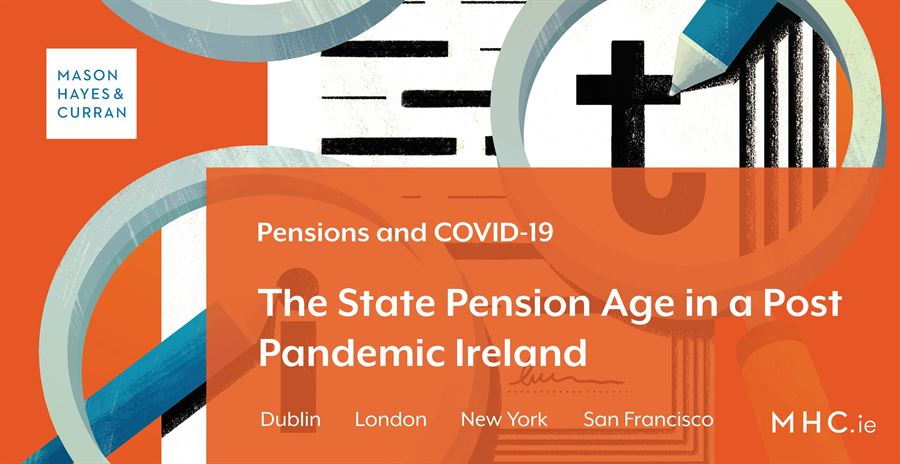Pensions & COVID-19: The State Pension Age in a Post Pandemic Ireland

The mooted increases in the State Pension age was a divisive issue during General Election 2020 with many political parties promising that it would not be increased to 67 in 2021 as planned. In light of the ongoing COVID-19 pandemic, we take a fresh look at this debate and consider the direction that it is likely to take with a possible economic recession and high levels of unemployment on the immediate horizon.
Background to the State Pension age debacle
Back as far as 2003, the Society of Actuaries in Ireland (the Society) called for an increase in the State Pension age. The increase was seen as fundamental to long-term pension planning in the country. When the Roadmap for Pensions Reform 2018 – 2023 was published by the last Government the Society welcomed its comments on the unsustainability of a static retirement age. In the Society’s view an increase in the State Pension age is equitable and necessary as it is linked directly to increasing life expectancies. As people live longer and spend a greater portion of their lives in retirement, the greater the pressure will be on the Social Insurance Fund (SIF) to continue paying the State Pension at its current level.
The Society has gone on to make the point that there is no time for procrastination. It added that this is likely to lead to a situation where a future government will be faced with the difficult choice of cutting the State Pension or increasing PRSI significantly. It goes without saying that neither option would be palatable for any government given the political ramifications. Other solutions such as means-testing the State Pension have been mentioned but the Society has said that increasing the State Pension age is the least painful option available.
The Social Insurance Fund
The SIF is made up of monies collected from people in employment. The monies are used to pay social insurance benefits including the State Pension. It is made up of a current account managed by the Minister for Employment Affairs and Social Protection and an investment account, which is managed by the Minister for Finance. In 2008, due to the onset of the credit crisis, the SIF fell into deficit with expenditure exceeding income by €250 million. The deficit continued to rise and peaked in 2010 at €2.75 billion. Where a deficit in the SIF occurs the exchequer steps in and underwrites the deficit amount. The SIF is audited every 5 years with the last audit occurring in 2015.
The Society previously estimated that the SIF would accumulate a deficit of €400 billion over the next 50 years. The actuarial review of the SIF in 2015 anticipates that the number of those over the present State Pension age of 66 will rise from 12% of the population in 2015 to 23% by 2055. The population of pensioners is also expected to rise from 586,000 in 2015 to 1.4 million by 2055. The Central Statistics Office has also predicted that life expectancies for men will rise from 79 to almost 86 by 2051 and forecasts an increase from 83 to 88 for women in the same period.
Given what occurred to the SIF deficit in 2008-10 there is little doubt that a possible recession created by the COVID-19 pandemic will have a serious negative impact on the SIF and potentially create further unforeseen deficits in each of the next few years as the level of unemployment increases. The next audit of the SIF is due to commence later this year.
General Election 2020
The General Election 2020 saw a range of promises from all of the parties relating to the State Pension age. Some parties promised to halt the planned increase to 67 in 2021 and to reintroduce 65 as the age at which the State benefit would become payable. Some took a different approach and suggested that employers could be forced to stop seeking compulsory retirement at 65. The last Government confirmed that it would continue with the planned increases to 67 in 2021 and to 68 in 2028. However, it also suggested that it would engage with the Labour Employer Economic Forum (LEEF) to allow a reassessment of the pace at which the State Pension age was being raised. Any future political debate on the State Pension age is likely to be parked for now, with State support for workers, small businesses and the unemployed dominating the political agenda.
Conclusion
Any electoral promise made to reintroduce 65 as the State Pension age must surely now be seen as an anachronism, at best. It is likely that the COVID-19 pandemic will continue to pummel the global economy leading to further temporary lay-offs, redundancies and salary cuts. As the number of those in employment falls, the level of PRSI payments being remitted from Revenue to the SIF will continue to drop with the potential of a further substantial deficit occurring over the next few years with further pressure on the Exchequer to make good the deficit. It seems that any remedial work to place the State Pension on a more sustainable footing will be parked until such a time as our economy returns to relative normality.
If you would like to discuss the novel issues arising as a result of the COVID-19 crisis, contact a member of our Pensions team.
The content of this article is provided for information purposes only and does not constitute legal or other advice.
Share this:




